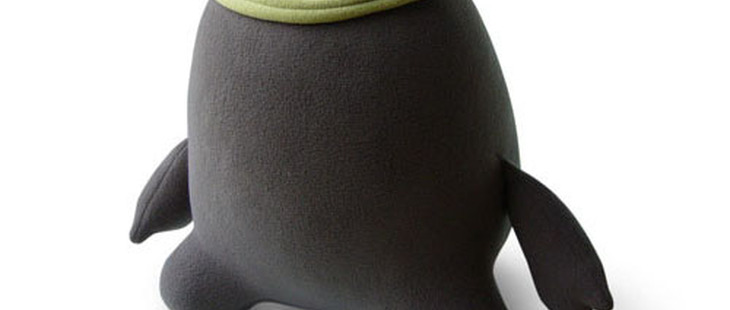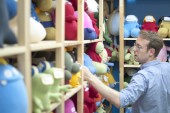

As the city emerges from the recession, and finds its feet in an increasingly knowledge-based and global economy, the Standard takes a bi-weekly, sector-by-sector survey of Toronto industry. Which businesses are thriving, which are struggling, and which are running out of time.
With its glass penthouses and living rooms, the Toy Factory Lofts in Liberty Village have little in common with the Irwin Toy factory it once was, a plant that, decades ago, employed 350 people. The building is today a monument that marks Toronto’s steady economic drift away from making things to selling condos.
Little would the lofts’ occupants know, however, that though the big factory’s gears are silent, Toronto’s toy story is far from over. Tons of playthings sold all over the world have their start on the city’s drawing tables and flatscreen monitors.
“People wouldn’t think of Toronto as a hotbed of toy development, yet it is,” says George M. Irwin, whose family sold Irwin Toy in 2000 before the firm went bankrupt. Irwin forged on, founding iToys Inc. (now iToys USA) with his brother, Peter, still in business today.
“In terms of North America, Toronto would probably rank third behind New York and Los Angeles in terms of product development and innovation in the toy industry,” he says. Considering that New York and Los Angeles are the world’s biggest toy-making cities, that ain’t bad. Irwin estimates that Toronto-owned companies produce about $1.2 billion worth of toys in terms of the manufacturer’s selling price, or $2 billion at retail.
Although the toys themselves are mostly made in Asia these days, “the genesis of the ideas, the responsibility of developing the brands and the marketing campaigns and the packaging (are all) started and done here in Toronto,” he adds.
Irwin’s intuitive sense of what the industry is worth isn’t far off, according to Gerrick Johnson, a U.S. toy industry analyst with BMO Capital Markets who studies America’s $21.8 billion retail market. Although the local toy companies launched in Irwin’s wake are privately held, Johnson knows them well.
“Spin Master, Ganz, Irwin, Thinkway — Toronto is a toy mecca,” he says. “It does seem to have a disproportionate amount of successful toy companies compared to other cities its size.”
Toronto has nothing comparable to the Fashion Institute of Technology at the State University of New York or the Otis College of Art and Design — two of the only schools in the U.S. with specialized programs in toy design, which feed new grads to the New York and L.A. industries, respectively. Yet Toronto’s healthy mix of art, industrial and graphic design programs pumps out talented workers for local companies like Thinkway, one of the top seven toymakers in the world, and Ganz, which changed the industry in 2007 with their plush Webkinz dolls, each of which corresponded to an online avatar. And though Irwin didn’t last, it left behind a sizeable knowledge base that helped incubate today’s toy makers.
Its sizeable creative community also makes Toronto a logical centre for so-called designer toys — low-tech, highly collectible figures made in small batches that seem more like works of art fit to dwell in a display case than fodder to be crushed under a toddler’s heel. Such toys are the mainstay of Queen West shop Magic Pony.
At the top of Toronto’s plaything heap sits Spin Master. The third-largest toy company in North America, with 450 employees in Toronto alone and offices all over the world, it is responsible for the wildly popular Bakugan, a game whose collectible marbles correspond to a popular anime show, and the powerful Air Hogs!, whose fast-moving planes, rockets and helicopters lead the world of remote-controlled toys. In its third straight year of double-digit growth, the firm is known for its high-tech, boy-centric playthings, as well as lucrative toy tie-ins with blockbusters such as Tron: Legacy.
Spin Master created lots of buzz at February’s Toy Fair in New York with its latest offering, Redekai, a game in the vein of Magic: The Gathering and Yu-Gi-Oh! Redekai promises to upend the stubbornly low-tech world of trading cards with what the company says is the first 3D card game. The plastic cards, which hit store shelves in the summer, don’t require glasses to produce their 3D effects, says spokesman Dale Gago.
“You stack them on top of each other,” he explains. “There are some see-through parts and some coloured parts, and when you stack them, you automatically see how the battle is developing between you and your opponent.”
These are good times to be in the toy business. Not only has the market picked up the momentum it lost during the recession, but with video games on the decline for the past two years, traditional playthings have picked up some of the share that used to belong to Halo, Grand Theft Auto and its ilk, says Johnson.
“The holy grail of toys right now is to figure out how to combine the physical and digital and make a lot of money,” he says — a problem that Ganz cracked once with Webkinz.
Despite Irwin’s long history here, Toronto hasn’t always been a centre for toy design and production. For most of its life, Irwin focused its operations on distributing foreign toys in Canada. It wasn’t until the Canada-U.S. Free Trade Agreement was adopted in 1988 that the company moved into the creation of original toys for export. When Irwin was sold about 85 percent of its product was developed in-house.
There may be an irony in the fact that original toys began flowing out of Canada just as Ontario’s manufacturing base was beginning to atrophy. Toy making had its heyday in Toronto, but it was short. Today the focus is almost exclusively on design.
Local toymaker Monster Factory once made all their cute, plush monsters right here in their Richmond St. West office, or through a local contractor. The arrangement fit the company of seven employees, who are hands-on with characters and fussy with fabrics. Starting last summer, however, they began making toys overseas, a move that co-founder Adam Dunn says allowed them to lower retail prices — and led the firm to sell more in the ensuing months than they had in the two previous years.
“If you’re scaling up at all, it precludes manufacturing anywhere but factories in China,” he says. “People liked that (our toys were) made in Canada until they looked at the price tag. It was a bit of a sticker shock.”
Dunn says that Toronto feels right as a toy city, with so many inter-related creative industries fostering grads with a feel for creating characters. He studied integrated media at the Ontario College of Art and Design, while his co-founders went to Ryerson for film and fashion.
As for whether the government has helped, the Federal Scientific Research and Experimental Development (SR&ED) tax credits, which benefit Canadian companies that are developing new or advanced technology, aids some toy makers, but not all. They don’t apply to the ages-old needle-and-thread tech Monster Factory uses on its plush toys, says Dunn.
While federal and provincial incentives have done a good job of helping Toronto companies invest in technological research and digital media, says Irwin, a more basic problem confounds many toycos — it’s still too hard for small businesses in Canada to get their hands on capital.
Monster Factory was turned down for a loan a couple of years ago, even though their revenues were “ten times as much” as the amount they were looking to borrow, says Dunn. He says they considered venture capital but ultimately shied away, partly because they were reticent about giving up equity to third-party decision makers.
“It had the feel of selling the farm on the eve of the harvest,” he says, adding that he might consider angel investors if he had to start the company over, although the investment community is notably stronger in the U.S.
“The saddest part about the whole thing is our banking system is such that it makes it tough for small businesses to do business,” he laments. “It’s [about] providing lines of credit. It’s making funds available to small businesses so they can avoid being undercapitalized and have access to reasonably convenient and affordable money. That’s probably the biggest concern of small businesses — capital is limited and when you do find capital it’s egregiously expensive.”
It wasn’t always this way. Years ago, Monster Factory secured a low-interest small business loan worth around $50,000 just after launching. They did it just by walking into a bank, he says, despite the firm’s mere $1,200 or so in sales up to that point.
“For us, it was great that (low-interest loan) program existed when it did. It helped us buy fabric and rent our first studio,” says Dunn. “That was nice. We paid that back. It got us on our feet. But post-economic meltdown the climate has changed.”
As Ontario’s small businesses shift their manufacturing overseas and expand into foreign markets, Dunn also thinks the province could help by providing targeted educational programs and other resources available to help smooth the transition.
“I don’t necessarily think manufacturing is the thing the government should be looking to grow,” he says. “Even figuring out what new businesses are out there, what’s going to replace manufacturing — I think our government has been slow to react.”
So far the city’s toycos seem to have had little trouble expanding on their own. And with the world’s appetite for consumer goods inching up, there’s plenty of room to play.














